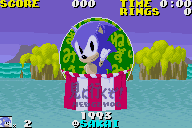Difference between revisions of "Mi ni Ikuzo! Hedgehog"
From Sonic Retro
m (Black Squirrel moved page Minic the Hedgehog to Mi no Ikuzo! Hedgehog) |
|||
| Line 5: | Line 5: | ||
| credits=Kiyoshi Sakai | | credits=Kiyoshi Sakai | ||
}} | }} | ||
| − | '''''Minic the Hedgehog''''', also known as '''''Mi no Ikuzo! Hedgehog''''' (見に行くぞ!HEDGEHOG), is a Japanese [[fan game]] developed for | + | '''''Minic the Hedgehog''''', also known as '''''Mi no Ikuzo! Hedgehog''''' (見に行くぞ!HEDGEHOG), is a Japanese [[fan game]] developed for [[sega:X68000|X68000]] computers in 1993 by Kiyoshi Sakai (co-creator of ''[[wikipedia:Umihara Kawase|Umihara Kawase]]''), and later ported to the [[sega:PlayStation|PlayStation]] using the [[wikipedia:Net Yaroze|Net Yaroze]] development kit in 1997. |
==Overview== | ==Overview== | ||
| Line 16: | Line 16: | ||
When the player makes it to the end of the level or gets a Game Over by running out of lives, the game resets to the title screen. | When the player makes it to the end of the level or gets a Game Over by running out of lives, the game resets to the title screen. | ||
| − | ==Version | + | ==Version differences== |
The PS1 version has a few differences compared to the X68000 version in that Sonic has been recolored red, and the title screen has been changed to a crudely-drawn Sonic doodle. The original blue palette data still exists in the game, and can be found at address '''0x0F8A9C''', while the red palette can be found at '''0x0F087C'''. | The PS1 version has a few differences compared to the X68000 version in that Sonic has been recolored red, and the title screen has been changed to a crudely-drawn Sonic doodle. The original blue palette data still exists in the game, and can be found at address '''0x0F8A9C''', while the red palette can be found at '''0x0F087C'''. | ||
==Screenshots== | ==Screenshots== | ||
| − | ===X68000 | + | ===X68000 version=== |
<gallery> | <gallery> | ||
File:MinicTheHedgehog_X68k_Screenshot1.jpg | File:MinicTheHedgehog_X68k_Screenshot1.jpg | ||
| Line 27: | Line 27: | ||
File:MinicTheHedgehog_X68k_Screenshot4.jpg | File:MinicTheHedgehog_X68k_Screenshot4.jpg | ||
</gallery> | </gallery> | ||
| − | ===PlayStation | + | ===PlayStation version=== |
<gallery> | <gallery> | ||
MinicTheHedgehog_PS1_Title.png | MinicTheHedgehog_PS1_Title.png | ||
| Line 42: | Line 42: | ||
'''NOTE:''' This is a PlayStation executable. To run it, boot it in ePSXe or any other PlayStation emulator. | '''NOTE:''' This is a PlayStation executable. To run it, boot it in ePSXe or any other PlayStation emulator. | ||
| − | ==External | + | ==External links== |
{{LinkRetro|topic=34899|title=Sonic Retro discussion thread}} | {{LinkRetro|topic=34899|title=Sonic Retro discussion thread}} | ||
* [http://ameblo.jp/koorogiyousyoku/entry-11872481976.html 見に行くぞ!HEDGEHOG on Sharp X68000, circa 1993, part 1] (Japanese) | * [http://ameblo.jp/koorogiyousyoku/entry-11872481976.html 見に行くぞ!HEDGEHOG on Sharp X68000, circa 1993, part 1] (Japanese) | ||
* [http://ameblo.jp/koorogiyousyoku/entry-11873316844.html 見に行くぞ!HEDGEHOG on Sharp X68000, circa 1993, part 2] (Japanese) | * [http://ameblo.jp/koorogiyousyoku/entry-11873316844.html 見に行くぞ!HEDGEHOG on Sharp X68000, circa 1993, part 2] (Japanese) | ||
* [http://ameblo.jp/koorogiyousyoku/entry-11874019305.html 見に行くぞ!HEDGEHOG on Sharp X68000, circa 1993, part 3] (Japanese) | * [http://ameblo.jp/koorogiyousyoku/entry-11874019305.html 見に行くぞ!HEDGEHOG on Sharp X68000, circa 1993, part 3] (Japanese) | ||
| + | |||
| + | ==References== | ||
| + | <references /> | ||
[[Category:Fan games]] | [[Category:Fan games]] | ||
Revision as of 09:42, 27 December 2018
| Minic the Hedgehog |
|---|
| Latest release date: 1993 (X68k), 1997 (PS1) |
| Credits: Kiyoshi Sakai |
Minic the Hedgehog, also known as Mi no Ikuzo! Hedgehog (見に行くぞ!HEDGEHOG), is a Japanese fan game developed for X68000 computers in 1993 by Kiyoshi Sakai (co-creator of Umihara Kawase), and later ported to the PlayStation using the Net Yaroze development kit in 1997.
Contents
Overview
The game only features a single level called "Final Zone Act 1", which should not be confused with Final Zone from Sonic the Hedgehog as it is a level with a tropical island theme in the vein of Green Hill Zone and Emerald Hill Zone. There are a variety of different paths for the player to take, filled with features and hazards such as loop-de-loops, floating platforms over bottomless pits, spikes, Crabmeats and Choppers.
The physics in this game are nowhere like those in official games, as Sonic has a lot of weight to his jumps, and is more prone to slipping downward on slopes, making running up inclines more difficult. There is also no music and only a few sound effects for Sonic's actions.
Among various monitors like rings, shields, extra lives and Invincibility, there are monitors displaying question marks. These appear to give the player rings when broken, but if the player has 50 or more rings, breaking it will display "SORRY!! BONUS STAGE IS UNDER CONSTRACTION." on the screen, suggesting that bonus stages were planned to be added to the game.
When the player makes it to the end of the level or gets a Game Over by running out of lives, the game resets to the title screen.
Version differences
The PS1 version has a few differences compared to the X68000 version in that Sonic has been recolored red, and the title screen has been changed to a crudely-drawn Sonic doodle. The original blue palette data still exists in the game, and can be found at address 0x0F8A9C, while the red palette can be found at 0x0F087C.
Screenshots
X68000 version
PlayStation version
Downloads
| Download Mi ni Ikuzo! Hedgehog
File: Minic the Hedgehog (PS1 Executable).zip (177 kB) (info)
|
NOTE: This is a PlayStation executable. To run it, boot it in ePSXe or any other PlayStation emulator.
External links
Sonic Retro discussion thread- 見に行くぞ!HEDGEHOG on Sharp X68000, circa 1993, part 1 (Japanese)
- 見に行くぞ!HEDGEHOG on Sharp X68000, circa 1993, part 2 (Japanese)
- 見に行くぞ!HEDGEHOG on Sharp X68000, circa 1993, part 3 (Japanese)











